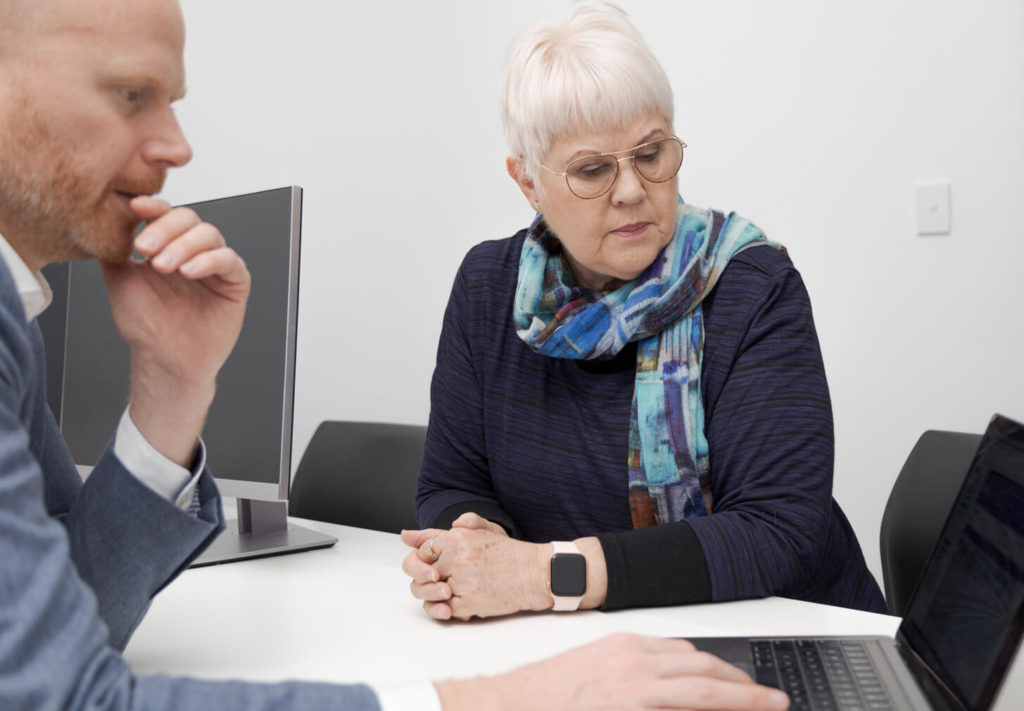The Sydney Colorectal Clinic is a specialist colorectal centre dedicated to the management of Colorectal Conditions. We provide a wholistic multidisciplinary approach to colorectal surgery

Sydney Colorectal Clinic
The Sydney Colorectal Clinic is a specialist colorectal centre dedicated to the management of Colorectal Conditions. We provide a wholistic multidisciplinary approach to colorectal surgery
Proctology
What are Haemorrhoids?
Haemorrhoids are vascular cushions within the anal canal. With haemorrhoids patients may experience itchiness, pain, bleeding or prolapse.
What are the treatment options?
Haemorrhoid treatments often starts with increasing fibre in the diet to avoid constipation, drinking more water though the day to avoid dehydration and hard stools, avoiding straining excessively on the toilet and limiting toilet time. We can also discuss different topical ointments to help with the haemorrhoids. Sometimes surgery is required.
Injection of haemorrhoids is utilised for earlier/less severe haemorrhoids and involves either injecting oily phenol or almond oil into the haemorrhoids.
Banding of haemorrhoids is utilised from slightly larger haemorrhoids and involves placing small bands internally above the haemorrhoids to help shrink the haemorrhoids and limit blood flow to the haemorrhoids to help prevent bleeding.
For larger haemorrhoids, we utilise an ultrasound or other device to find vessel causing the haemorrhoid problem and place a dissolving stitch internally to prevent bleeding. During this procedure we also can repair some of the prolapse associated with larger haemorrhoids.
Occasionally haemorrhoids can be so sizable they require an operation where we surgically excise them. This operation helps with prolapse and larger haemorrhoids.
What is a Fissure?
Fissures are painful breaks in the skin or lining of the anal canal that can be incredibly painful. Most patients experience pain on passing a bowel motion which can persist through the day. The pain is due to spasm of the anal sphincter complex and can be quite debilitating
What are the treatment options?
Treatment involves avoiding constipation and protecting the skin near the anal canal by using wet wipes and applying emollients
Some topical ointments can help. Rectogesic is a brand of ointment which helps by relaxing the sphincter spasm. Diltiazem is another ointment which can be prescribed as an alternative
In cases which are persistent or troublesome an injection of Botox can help. This is a fairly quick day surgery procedure completed under a light general anaesthetic which helps by using Botox to relax the sphincter spasm. There are other surgical options also available for complex fissures which can be discussed during your consultation.
What is a Fistula?
Perianal fistulas often commence as an infected oil gland in the anal canal which ruptures at the skin resulting in a connection (or tracks) between the anal canal and the skin. These can result in discharge, pain or recurrent infections. The treatment for these is highly specialised and depend on the cause and extent of the tracks. Occasionally fistula surgery requires a series of procedures to best deal with the problem
What are the treatment options?
A Seton Drain is a rubber band often placed in the first instance when the fistula is diagnosed. A seton drain helps to control the infection that can occur when people have fistulas. They work by preventing infection build up in a fistula.
An excision if possible, a fistula may be surgically excised.
If the fistula tract cannot be excised, the tract may be sealed up or closed using different techniques. Options include clips or pugs that help to seal up the tract through different methods. We can explain these options in depth during your consultation. Each operation is tailored towards your specific case.
What is a prolapse?
Rectal Prolapse refers to a condition where the rectum protrudes out through the anus. The condition is highly variable ranging from mucosa (or superficial) prolapse to full thickness rectal prolapse. The condition can develop through the aging process, but certain weaknesses of the pelvic floor or anal sphincter complex can predispose to the condition occurring.
What are the symptoms?
Symptoms can range from anal discharge or seepage to patients feeling their rectum protrude to the point where they need to manually press the rectum back into place.
What are the treatment options?
Surgery can help to fix this problem and there are multiple different procedures.
A Delorme’s procedure is a procedure where the protruding mucosa (superficial lining of the bowel) is resected and the intestine repaired using dissolving sutures.
An Altemeier’s procedure is a procedure where the prolapsing bowel (both the superficial and deeper layers) are excised and the intestine is repaired using dissolving sutures. Both the Delorme’s and Altermeier’s procedure are completed under a type of general anaesthetic and avoid the need for major abdominal surgery.
If the rectal prolapse is quite significant with a sizable portion of rectum protruding out, sometimes and abdominal procedure is required. This is completed via laparoscopy (or ‘keyhole” surgery) where the strength of the pelvic floor and rectum is supported to prevent prolapse.
At the Sydney Colorectal Clinic, we can go through the different treatment options and strategies that can best treat this condition
Faecal incontinence is a troubling condition. Many patients have put up with symptoms for quite some time before seeking help. Often patients have had symptoms for years. The condition can range from anal seepage to incontinence of gas or stool. This can occur due to weaknesses of the pelvic floor and or anal sphincter complex.
What are the treatment options?
There are multiple treatment strategies for Faecal Incontinence which include;
- Dietary changes
- Medication management
- Pelvic floor physiotherapy, and
- Surgery
In some cases, surgery is required. The surgical option depends upon the findings of our investigations and is tailored to each patient.
Surgery may include;
- Sphincter injection
- Sphincter repair
- Sacral nerve stimulation
In the first instance it is worth filling out our incontinence questionnaire to help determine the extent of your symptoms:
(insert link to patient care pathway for incontinence PDF document)
Following on from this we will review your case and arrange preliminary investigations (pelvic floor imaging, functional studies and colonoscopy). Depending on the findings we can then arrange pelvic floor physiotherapy and other biofeedback programs to help with the condition.
Colonoscopy & Upper Endoscopy
Colonoscopy and upper endoscopy are procedures during which a flexible camera inspect the gastrointestinal inner lining. Both of these procedures are usually completed under a sedation anaesthetic and typically are completed as day procedure cases.
In upper endoscopy the flexible camera inspects the oesophagus, stomach and the first part of the small intestine. Depending on the indication of the procedure, biopsies may be taken to analyse for digestion abnormalities, infections of the stomach lining and to analyse for other causes of reflux or peptic ulcer disease
In colonoscopy the flexible camera inspects the anal canal, rectum, large bowel and end of the small intestine.
(insert link for bowel prep instructions)
(insert link for post endoscopy/colonoscopy instructions)
Colorectal Polyps & Cancer
Colorectal cancer is incredibly common occurring in up to 1/11 Australians and is the second most common cancer in Males and Females in Australia. Colon polyps are a precursor to colorectal cancer where growths of the lining of the bowel develop.
(insert link to bowel cancer at cancer.org.au [https://www.cancer.org.au/cancer-information/types-of-cancer/bowel-cancer]).
It is a condition that has a good prognosis and good chance of cure especially when detected early. Colorectal Cancer is treated principally with surgery however may require additional therapies with either chemotherapy or radiation therapy.
What can cause colorectal cancer?
The cause of colorectal cancer multifactorial. Colorectal cancer typically develops from polyps in the bowel where both environmental and inherited factors are implicated. Diets high in red meat, obesity, smoking, lack of physical exercise, excessive alcohol intake have all been shown to increase the risk of colorectal cancer. In contrast diets high in fibre, vegetables and fruit have been shown to decrease the risk of cancer developing.
What are polyps?
Polyps are growths within the bowel which commence as outpouchings of the lining of the bowel. Given time they may develop into a bowel cancer, however it is generally accepted that their rate of transition to cancer occurs over an extended period of time. Because they can turn into cancer, removal of polyps is quite critical in cancer prevention. Removal is usually performed during a colonoscopy, however occasionally surgery may be required.
What are the symptoms?
Bowel cancer may be present in patients who do not have any symptoms and hence screening is incredibly important. When symptoms are present, they may range from a change in bowel habit (diarrhoea, constipation or bleeding). Anaemia (a low blood count) is another relatively common presentation. Pain and weight loss are usually late symptoms as is a bowel obstruction or blockage.
What are the treatment options?
Colorectal cancer is generally treated with surgery. Surgery is targeted to your specific case. Depending on your case, the best option for treating your problem may be with laparoscopic (keyhole surgery), open surgery or robotic surgery.

In addition to surgery chemotherapy or radiotherapy may also be used. In less than 5% of cases patients may require a stoma, or bag, where the bowel is brought out onto the skin surface. This may be permanent or temporary depending on the location of the cancer and the type of operation performed.
The two commonest types of inflammatory bowel disease are Ulcerative Colitis and Crohn’s Disease. Symptoms can be quite variable between patients.
Ulcerative Colitis
Ulcerative Colitis is a condition which affects the large bowel only, rectum and colon, where the inflammation within the intestine starts from the rectum working its way backwards through the colon.
Crohns Disease
Crohns Disease can affect any of the components of the intestine. In fact, the inflammation from Crohns disease may extend anywhere from the mouth, oesophagus, stomach, small bowel large bowel and anus. Patients with Crohn’s Disease may also experience fistulas near the anal canal.
Both conditions (Ulcerative Colitis and Crohn’s Disease) may also affect other parts of the body including the eyes, skin, joints and liver. The conditions have been extensively researched and there is ongoing debate and investigation into the underlying cause of the condition.
What are the symptoms?
When affecting the intestine, inflammatory bowel disease may cause symptoms of abdominal bloating, weight loss, intermittent fever, diarrhoea, colonic mucous production or rectal bleeding.
How are these conditions diagnosed?
The diagnosis of inflammatory bowel disease is often made during colonoscopy or endoscopy where biopsies of the intestine are taken and analysed. Blood tests, stool tests and imaging investigations (MRI or CT scans) may help assess the extent of the illness.
What are the treatment options?
Fortunately, most patients can be treated successfully with modern medications that keeps the condition under control or even causes a complete remission.
Surgery is sometimes required for different reasons. Occasionally infections develop (for example in the cases of Crohns disease and perianal abscesses or fistula) which are best treated with surgery. Also, sometimes the illness either doesn’t respond to medications or patients are unable to take the medications. In these circumstances’ surgery may be suggested as the next step of treatment. We work closely with our gastroenterology colleagues to work out the best treatment strategies to help
Insert link to www.crohnsandcolitis.com.au
What is Diverticular Disease?
Large bowel diverticulum are outpouchings of the large bowel which occur at a weak point of the outer muscular lining of the bowel. This allows the inner lining to bulge out. The bowel may have many small or large pockets of diverticulum. The disease is incredibly common with approximately 60% of the population at the age of 60 years old have the condition.
Diverticulum may become infected or inflamed (which is when we use the term diverticulitis). 20% of patient with diverticulum will develop diverticulitis at some stage in their life.
What are the treatment options?
The treatment of diverticulitis is constantly changing. Occasionally in very mild episodes, the inflammation simply settles by itself over a few days. Patients should keep their fluids up, take simple analgesia and rest up. If patients can have anti-inflammatories, these often help (so long as only taken for short period). Antibiotics are typically used in worser cases of diverticulitis.
Some cases of diverticulitis require hospital admission. In these circumstances we often will monitor your inflammatory markers with blood tests and may need to perform a CT scan of the abdomen. The treatment in these cases often requires intravenous antibiotics, an IV drip to keep your fluids levels up, and bowel rest. In some severe cases surgery is needed.
Following an episode, you may need to initially be on a low fibre diet (low roughage) so as to limit the material passing through the colon. Longer term once an episode has fully settled, avoiding constipation and maintaining a high fibre diet is beneficial. We can help with nutritional advice and referral to a dietician.
Hernias

A hernia is a bulging or protrusion of an organ or tissue though an abnormal opening.
The more common abdominal hernias are groin hernias (which can be over the inguinal or femoral region) or abdominal wall hernias (ventral, umbilical/belly button, supraumbilical/above the belly button).
Hernias can also develop after surgery if a weak point develops over the incision site.
What can cause occurrence of Hernias?
Multiple factors contribute to the development of hernia. There are genetic, environment and patient specific factors that all contribute to hernias developing.
These factors below along with many other activities may predispose to hernias forming. Once a hernia develops, most of the time surgery is required.
- Straining
- Chronic cough
- Smoking
- Constipation
- Heavy lifting
Abdominal Wall Defects or hernias may develop spontaneously or following any abdominal procedures. These may be quite small in size or be extensive where patient have large defect in where abdominal contents bulge out.
What are the treatment options for Hernias?
In small to moderate size hernias, the repair may require a suture technique or more commonly a combination of suture with either a graft or mesh may be required. Occasionally additional treatments such as preoperative Botox, weight loss strategies and exercise plans may be required. We can assist you with all of these components
